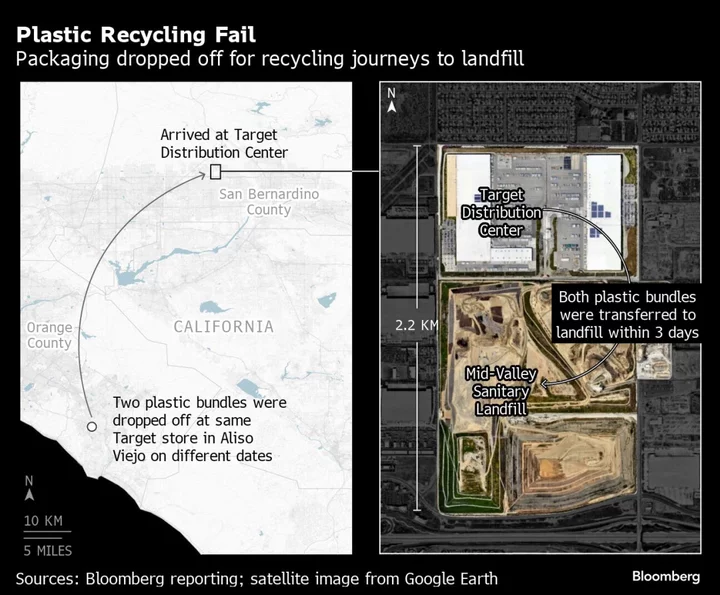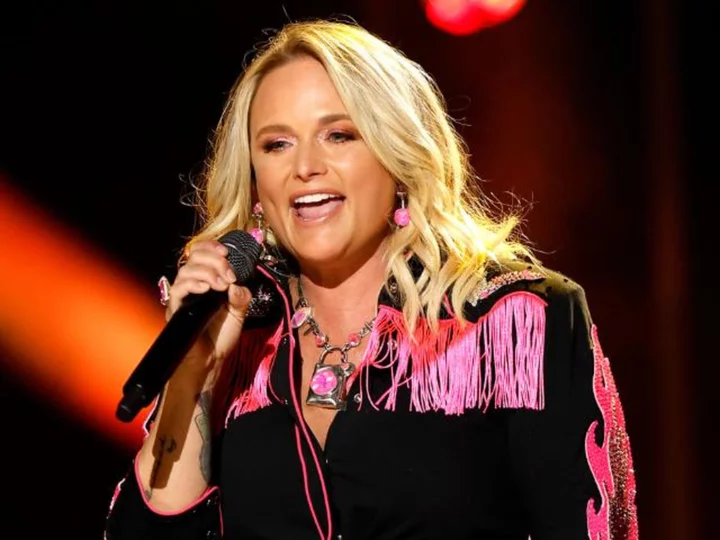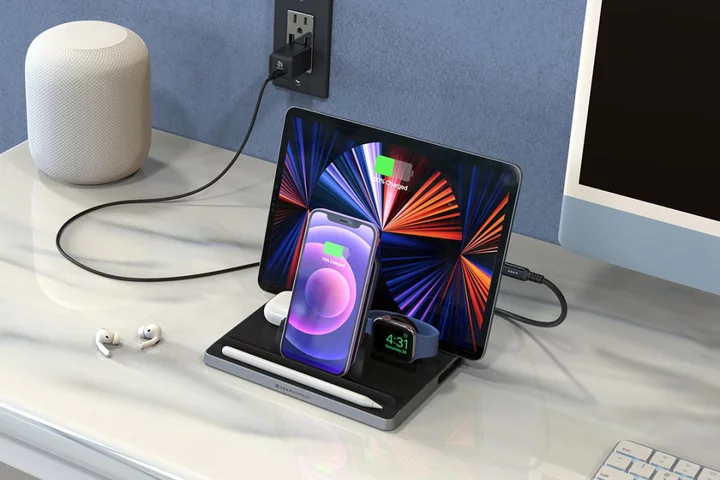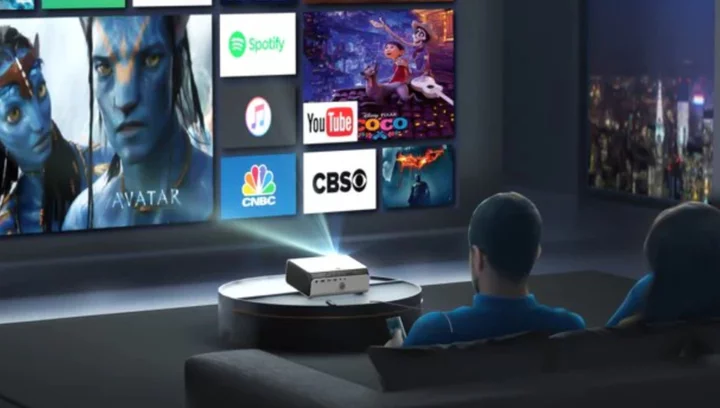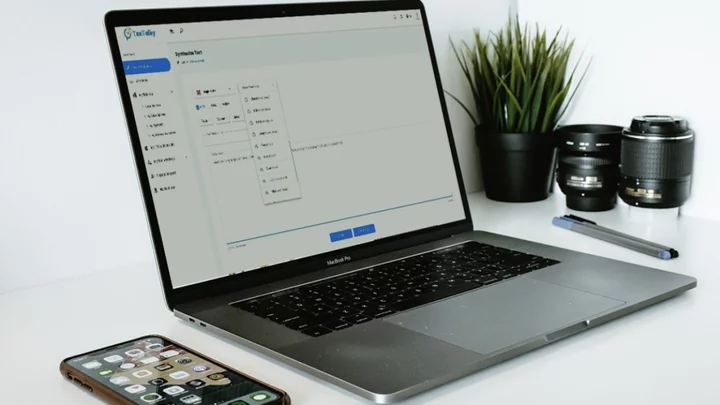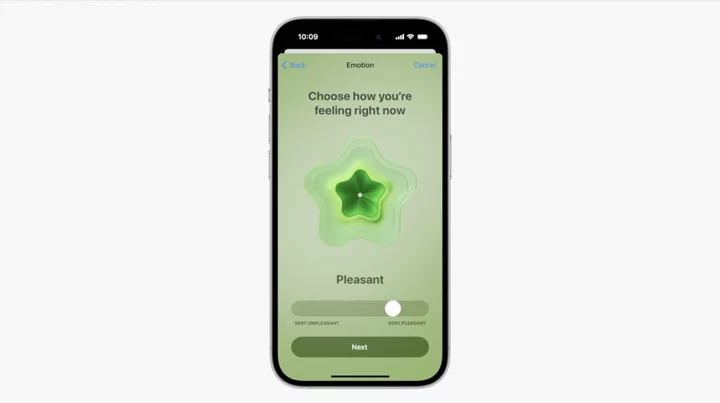The former teen idol Zac Efron is riding a skateboard, and then he’s dressed for some reason in a bee-keeper’s uniform. He’s talking about the “pretty freaking cool” second life of recycled plastics, including the wrappers of Nature Valley granola bars, that have been ground down to make park benches and picnic tables. “The planet deserves better,” Efron says, “and in-store recycling is an easy first step.”
This 2021 video posted to Efron’s Instagram account received nearly 7 million likes. The sponsor, food giant General Mills Inc., worked with the High School Musical star in an effort to spread the word about a recycling program that uses “store drop-off” labeling. It’s become a last line of defense against landfills for companies that sell plastic-wrapped consumer products. Municipal recycling programs almost always reject flimsy, low-value packaging materials.
More than 500 brands sold in the US and Canada participate in store drop-off recycling, using labels from an effort called How2Recycle that tell customers to bring used packaging waste to about 12,000 retail outlets. The instructions are printed right on the wrappers, and a web link directs consumers to retailers that offer special bins inside the stores. It’s likely one of the world’s biggest in-store recycling efforts.
Amazon.com Inc., Nestle SA and Procter & Gamble Co. are among the companies that have signed up to slap store drop-off symbols — complete with the three-arrows recycling logo — on tens of thousands of consumer products found in American homes. Target Corp., Home Depot Inc. and Kroger Co.-owned stores are among those collecting the packaging. GreenBlue, a Charlottesville, Virginia-based nonprofit whose board includes executives from consumer brands, packaging companies and Dow Chemical Co., oversees the How2Recycle labeling program.
A Bloomberg Green investigation has found that the packaging dropped off for recycling at US retailers often ends up in landfills. We placed trackers in 30 bundles of plastic packaging and wrappers — all marked with store drop-off labels — stuffed inside shopping bags and deposited the recycling at stores in nine states and Washington, D.C. All the bundles contained up to a dozen pieces of recyclable plastic, including wrappers from Ritz crackers (produced by Mondelez International Inc.), Gerber baby cookies (produced by Nestle), and drink packaging on Coca-Cola Co. products.
Thirteen of the trackers — more than 40% — ended up at landfills. Only four arrived at locations that recycle plastic. The remaining trackers stopped sharing location data before reaching a final destination. GreeenBlue declined to comment for this story. A representative for Zac Efron didn’t respond to requests for comment.
Three trackers inside plastic bags dropped off at Target stores in California wound up inside landfills, and another tracker’s final ping came from a location next to a garbage dump. One tracker dropped off at a Target in New York City wound up at a landfill in Uniontown, Alabama, more than 1,000 miles away. Other plastic bundles deposited at grocery stores, including a Food Lion in Delaware and QFC in Seattle, also ended up in landfills.
One company, Virginia-based Trex Co., received three of the four plastic bundles that ultimately made it to a recycler. The company turns plastic from drop-off programs, along with industrial plastic film used by retailers to hold pallets of goods together, into decking material and lumber.
Yet the company warned there isn’t enough demand for plastic packaging recycling to make the drop-off system successful. Few firms want to pay the higher costs to use recycled plastic. “All the claims the companies are making are just greenwashing,” said David Heglas, a Trex executive who’s worked in the industry for nearly three decades. “Recycling’s failed.”
This isn’t the first time trackers sent into a supposed recycling system from drop boxes at a major retailer have turned up in unexpected places. Tesco Plc, the largest supermarket chain in the UK, collects flimsy plastic at its stores. Bloomberg trackers bundled with three items revealed a messy ecosystem of middle men and, in one case, an industrial incinerator. Plastic packages traveled more than 2,000 miles from London, ending up as far away as Poland to Turkey without being recycled. At the time, Tesco said it was committed to minimizing single-use plastic.
For years, much of the plastic trash in the US embarked on a long journey to China. The ban on overseas waste imports by China in 2018 prompted many curbside collection programs in the US to stop taking plastic films such as shopping and bread bags. Seattle, for example, stopped recycling plastic bags in 2020. Meanwhile, states such as New York and New Jersey imposed bans on plastic bags while municipalities halted collecting them for curbside recycling but also required retailers to offer collection programs for the unwanted material.
GreenBlue’s How2Recycle logo program, which had begun in 2012, took off around the same time. Costco Wholesale Corp. and more than 100 other companies joined the program by the end of 2018. The logo program was designed to communicate recycling instructions to consumers, making it clear which packages can be dropped off at stores. Other labels from How2Recycle indicate which items can be widely recycled or should not be recycled at all.
How2Recycle said in a 2020 report that it issues recyclability labels to brands and retailers for over 225 products daily, with about 10% using the store-drop off label that can be found on products as common as shipping pouches as well as packaging on marshmallows, cereals and other snacks sold in the US and Canada.
The world’s biggest consumer companies from Procter & Gamble to Unilever Plc and Coca-Cola Co. use the group’s store drop-off label on their packaging. Companies pay as much as $8,500 to join to have their packaging vetted and approved. Member companies represent more than a third of the consumer packaged goods industry with North American annual sales revenue of $680 billion, and collectively those members’ companies own 2,600 brands, according to How2Recycle.
Neither How2Recycle nor its parent, GreenBlue, oversee facilities that collect plastic. The program’s website points to a directory run by a consulting firm, Stina Inc., that lists retailers that collect the plastic. Stina CEO Nina Butler said the company previously received funding from the plastics industry to maintain the directory. But the funding has since ended. That’s why the store-drop off directory, which began in 2003, can be out of date and relies on crowd-sourced feedback, Butler said.
The failure of material collected through the store drop-off program to reach recycling facilities isn’t just an environmental problem. In some cases it might run afoul of local laws. One of the trackers moved from high-end grocery store Sprouts in Los Angeles to a recycling facility in Baja, Mexico, which some activists say breaches a state law requiring plastic bags be recyclable in California. New York, Delaware and Rhode Island also require some retailers to collect and recycle plastic bags and film.
California Attorney General Rob Bonta, who’s spearheading an investigation into recycling rates for plastic shopping bags, has been pursuing evidence from manufacturers that plastic bags can be successfully recycled in California. In an interview he raised concerns that the in-store recycling programs could constitute deceptive marketing.
“All of it is very disappointing to me,” Bonta said. “If the industry's going to make the claim then the recycling has to be happening in actuality.”
Read More: Investigations Into Big Plastic and the Global Recycling Problem
Retailers offered a mix of explanations for how the trackers ended up in landfills. A spokeswoman for Target said there are too many variables to address why plastic bags dropped off at its stores ended up in garbage dumps, including that bags that are wet or dirty are considered contaminated and discarded at stores after a visual examination by employees. The company said it collects about 24 million pounds of plastic bags and film each year.
The company said the bulk of the material collected through store drop-off is recycled to make packaging and shopping bags, including ones for use at Target stores. On its website, the store touted that it joined the U.S. Plastic Pact, which includes a goal to “effectively recycle or compost 50% of plastic packaging” by 2025.
“We recognize and take seriously the role we play in reducing waste,” a Target spokeswoman said.
Target isn’t alone. Plastic bundles dropped off at some of the US’s biggest retailers, including Home Depot, Safeway Inc., Ralph Grocery Co., and Gelson’s Markets also ended up in landfills. Most consumer brand companies, including Amazon, Nestle and Unilever, said they don’t control the management of plastic waste once it is dropped-off by customers and leave responsibility for the actual recycling to others down the chain. General Mills, which makes Nature Valley bars, said the company aims to design packaging to be recyclable and clearly label products for consumers using common icons and language provided by How2Recycle. Procter & Gamble and Coca-Cola declined to comment.
Kroger, which owns Ralph’s and QFC, said that plastic film from its stores is transferred to recyclers who then remove contaminants before recycling it. Neither of those trackers registered going to any other locations, and instead went from the retail outlets to a landfill or a municipal waste station, which would then send it to the dump.
A Sprouts representative also said it uses third-party recycling partners to sort plastics. In one instance, the company said Bloomberg’s tracker was sorted out along with food and other contaminants and sent to the city waste station. The company said another tracker, which made its way to a recycler in Mexico, was removed and handled properly. Representatives for Gelson’s and Home Depot said material from its stores is sorted and trackers may have ended up discarded into landfills as items that could not be recycled.
John D. Atkinson, a professor of environmental engineering at the University at Buffalo, State University of New York, is one of the rare people to look through every piece of plastic collected at two New York retail locations for his research into recycling contamination. It’s a job some retailers, such as Home Depot, said they assign to store employees. But Atkinson is skeptical, given the hours it would take.
“That does not seem feasible to me,” he said. “The act of taking it out and undoing everyone’s wrapping took hours.”
At Trex, which counts Albertsons and Kroger as clients, most of the bales of plastic from store collections arrive intact, just as customers deposited them. That means food, liquid and other trash mixed in, according to Heglas, the senior director of material management. Trex doesn’t recommend retailers sift through it for safety reasons, as some bales can have broken glass or even needles in them.
The company has designed its system to accept contaminated items missed by its employees, who try to weed out as much as they can before the plastic is mixed in with wood and other products to make decking. “There’s pressure on companies to put recycling labels on everything,” said Heglas. “Just because a package has that label on it, doesn’t mean it will be recycled. The material may be recyclable, but there’s no demand for it.”
Some brands who once embraced in-store collection efforts are having second thoughts as well. Mondelez International Inc., the maker of Ritz Crackers and Oreo cookies, said in late March that it plans to phase out the label by 2025. “We are reviewing our approach to communicating recyclability information about select packaging,” the company said on its website. Mondelez representatives did not respond to requests for comment.
The sheer size of the store drop-off effort makes it the most extensive retail recycling initiative of its kind in the US. Unlike in Europe, federal law in the US doesn’t require that producers of packaging prove that a targeted percentage is being recycled or provide subsidies for recycling efforts. There’s no incentive for brands or companies to ensure that recycled plastic is being used to make other plastic products when virgin plastic —resin that comes from petrochemicals like crude oil or natural gas — is much cheaper.
Trex and a few other recyclers that take soft plastics like those collected via store drop-off bins don’t have enough capacity or demand to take all the waste from store programs. That hasn’t stopped the momentum as companies pledge to increase sustainability goals while more brands turn to cheaper, flexible plastic packing for an array of consumer items from food to drinks to cosmetics.
Even the organizers of this system have acknowledged that it can’t accommodate all the plastic. “Store Drop-Off is the only recycling option for flexible packaging at scale,” How2Recycle said in a 2020 report. “However, the ability of the Store Drop-off stream to alleviate the packaging industry’s end-of-life challenges with flexible packaging will be likely limited long term.”
The lack of regulation and enforcement to contain the plastic waste crisis has forced some consumers to turn to the courts to seek change. That citizen backlash includes Jan Dell, a founder of environmental nonprofit The Last Beach Cleanup and chemical engineer who sat on California’s CalRecycle board. She has placed tracker tags of her own in wads of plastic bags and said most ended up in landfills.
“It’s a big lie that’s meant to deceive consumers into using more plastic,” said Dell.
Last year Dell’s group lodged lawsuits against two retailers for allegedly violating California’s in-state recycling requirements. A California court ruled in July that associations like hers have ground to file suits, allowing her complaints to proceed. “It’s just a big myth that all this plastic is being recycled,” she said, “and at its worst, a hoax.”
Read More: Can You Recycle That? The Ultimate Cheat Sheet to What Can Go in the Bin

